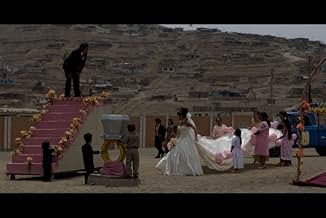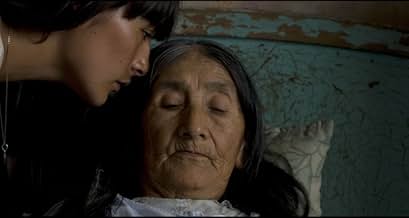VALUTAZIONE IMDb
6,7/10
7560
LA TUA VALUTAZIONE
Fausta soffre di una rara malattia chiamata "Milk of Sorrow", che viene trasmessa attraverso il latte materno delle donne che sono state maltrattate durante o subito dopo la gravidanza.Fausta soffre di una rara malattia chiamata "Milk of Sorrow", che viene trasmessa attraverso il latte materno delle donne che sono state maltrattate durante o subito dopo la gravidanza.Fausta soffre di una rara malattia chiamata "Milk of Sorrow", che viene trasmessa attraverso il latte materno delle donne che sono state maltrattate durante o subito dopo la gravidanza.
- Regia
- Sceneggiatura
- Star
- Candidato a 1 Oscar
- 16 vittorie e 6 candidature totali
Recensioni in evidenza
I can see that or why many people will like this movie. There is the very great portrayal of the main actress, there is running theme in here that speaks to many art-house fans (even those who may not know that they are).
The pacing might seem awkward, some twists in the story line and/or character arc, might not be accessible to some viewers, but all those things make the movie even better. At least that's how I see it. Still as this is a movie that provokes or encourages you to think a lot, there might come up a few questions, story-wise and or character-wise that might leave you with a slightly bad taste.
And although up until now the review the user GeneralGrievous gave hasn't received positive feedback, you have to cut the guy some slack. If you read his review, you can understand why he didn't like the movie quite as much. I thought his review was helpful, even though I don't agree on everything he writes, because he explains not only why he thinks that way, but he gives a few glimpses into his knowledge of Peruvian film-making.
The pacing might seem awkward, some twists in the story line and/or character arc, might not be accessible to some viewers, but all those things make the movie even better. At least that's how I see it. Still as this is a movie that provokes or encourages you to think a lot, there might come up a few questions, story-wise and or character-wise that might leave you with a slightly bad taste.
And although up until now the review the user GeneralGrievous gave hasn't received positive feedback, you have to cut the guy some slack. If you read his review, you can understand why he didn't like the movie quite as much. I thought his review was helpful, even though I don't agree on everything he writes, because he explains not only why he thinks that way, but he gives a few glimpses into his knowledge of Peruvian film-making.
Claudia Llosa writes a peculiar, but captivating story of a young Peruvian girl living in a constant world of fear on the outskirts of Lima. Fausta is believed to be suffering from a rare disease, "La teta asustada," or the "Milk of Sorrow," which was transmitted from her mother's breast milk after she was raped by terrorists during the time of Sendero Luminoso. Facing her mother's death, Fausta is forced to overcome her fear and work in the Big House of a limeña musician. While both the music and filming are stunning, I feel that the film lacks much action or thick plot. I found it to be more of a journey, one that led Fausta from her fear to a glimpse of her freedom. Furthermore, as a viewer who has lived in Peru, the film was very nostalgic for me and I felt that it portrayed Lima and the "pueblos" with a profound sincerity.
If you are looking for a poetic and beautiful journey of a story, this film is exactly that.
If you are looking for a poetic and beautiful journey of a story, this film is exactly that.
Our heroine is called Fausta, a girl who is full of fear. "The Milk of Sorrow" or, more exactly "The Frightened Tit" is, in the Peruvian-indigenous tradition, an illness, is being condemned to be a coward. Peru's late History was influenced by guerrilla's warfare and state brutality. Women (like Fausta's mother) were raped, and raped women got sick... of fear. through her mother's milk Fausta is afraid of life, but she is by no mean a coward, because after her mother dies, her struggle is by herself. This movie is beautiful, it combines a very, very strong performance from Magaly Solier, and a universal human struggle in a very typical Latin American city.
Writer/director Claudia Llosa loosely adapts the premise of old-time classics 'The Little Mermaid' and 'Faust' to contemporary Peru. Fausta, beautifully played by Magaly Solier, is a solitary, indigenous girl whose heart is gripped by fear. Her mother, who we see on her deathbed at the start of the film, was raped and scarred for life by The Shining Path (a radical Maoist organization that terrorized Peru during the 80s and early 90s). According to their indigenous culture, the terror felt by Fausta's mother was passed on to her through breastfeeding, a condition they call 'The Milk of Sorrow' (in Spanish, 'La Teta Asustada', which translates to 'The Frightened Tit'). Fausta is deeply suspicious of people around her, particularly men, and expresses her repressed emotions only through singing, as she performs her daily chores. Desperately in need for money to bury her dead mother, she begins to work as a housekeeper for Aida, a musician who is preparing for a concert and becomes interested in her songs of sorrow.
Llosa observes the social realities of Latin America (post-colonialism, class division, political violence), but avoids providing facile solutions. Instead, she focuses her attention on Fausta's more personal need for spiritual freedom. She does so with quiet, subtle humor and an eye for striking, poetic imagery.
I highly recommend watching this Academy Award nominee for Best Foreign Language Film and winner of the Berlin International Film Festival.
Llosa observes the social realities of Latin America (post-colonialism, class division, political violence), but avoids providing facile solutions. Instead, she focuses her attention on Fausta's more personal need for spiritual freedom. She does so with quiet, subtle humor and an eye for striking, poetic imagery.
I highly recommend watching this Academy Award nominee for Best Foreign Language Film and winner of the Berlin International Film Festival.
I was so touched by this film, which is obviously a low budget production. It proves that you do not need a multi-billion budget to make a good movie. I think only women can understand fully the pain and the fear the heroine had to go through. I wonder if they produce a sound track for the movie. The songs by the heroine and that sonata adopted by the pianist were beautiful. Solier is a great actress and her facial features, well, what can I say, is not the kind of glamour you find on screens. She has character, reflecting her heritage. I immediately take a liking of her from the first few scenes.I It is disturbing to find people snubbing such a beautiful movie but I guess everyone to his/her tase.
Lo sapevi?
- QuizMagaly Solier used to sell Puca picante (Andean treat) in the street before she was discovered by Claudia Llosa in 2005 while looking for extras for Madeinusa (her first film). Now she's a recognized actress and talented singer.
- ConnessioniFeatured in Brief Film Reviews: The Milk of Sorrow (2010)
- Colonne sonoreQuizás algún día
Music by Magaly Solier
Lyrics by Claudia Llosa
Performed by Magaly Solier and Bárbara Lazón
I più visti
Accedi per valutare e creare un elenco di titoli salvati per ottenere consigli personalizzati
- How long is The Milk of Sorrow?Powered by Alexa
Dettagli
Botteghino
- Lordo Stati Uniti e Canada
- 10.462 USD
- Fine settimana di apertura Stati Uniti e Canada
- 1914 USD
- 29 ago 2010
- Lordo in tutto il mondo
- 1.557.750 USD
- Tempo di esecuzione
- 1h 35min(95 min)
- Colore
- Mix di suoni
- Proporzioni
- 1.85 : 1
Contribuisci a questa pagina
Suggerisci una modifica o aggiungi i contenuti mancanti






















